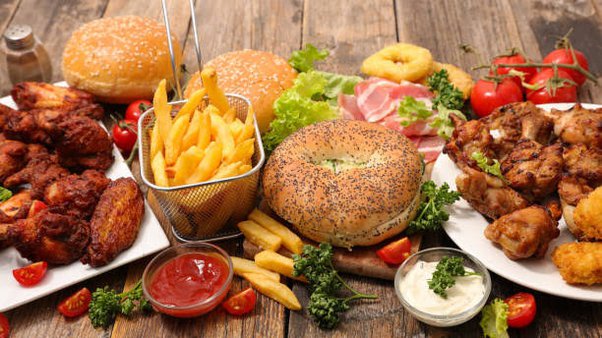We have all heard the saying “slow down and enjoy your food,” but how many of us actually follow that advice? Eating fast has become the norm in our society. And it is having some serious consequences. Studies have shown that eating quickly can cause weight gain because of several reasons. In this blog post, we will discuss why eating fast causes weight gain. We will also provide tips on how to eat slowly and enjoy your food!
Contents
Does Eating Faster Make You Gain Weight?
 The answer to this question is a little complicated. While some studies have found that eating faster may lead to weight gain, other research suggests the opposite.
The answer to this question is a little complicated. While some studies have found that eating faster may lead to weight gain, other research suggests the opposite.
To start with, there are several potential mechanisms at work behind this link between eating speed and weight gain. One of these mechanisms is a phenomenon known as “incomplete meal termination.” This is when a person does not stop eating when they feel full, which can lead to overeating.
In many circumstances, eating fast causes weight gain because it encourages overeating and increases the number of unneeded calories consumed. So, the answer to this question is yes—eating faster can lead to weight gain if it causes people to eat too much.
Yet, there are some studies that suggest eating quickly may actually help with weight loss. There is evidence that suggests fast eaters consume fewer calories overall than slow eaters and have better control over their portion sizes. Overall, it could be argued that the speed at which you eat is less important than how much you’re eating.
Why Does Eating Fast Causes Weight Gain?
There are several reasons why eating fast can lead to weight gain. Here are the top 10 reasons that are most often cited.
Overeating
One of the common causes of weight gain from eating too quickly is overeating. Eating more than you need can lead to unhealthy weight gain. When you eat too fast, your body does not have time to register that it’s full, which leads to unnecessary extra calories being consumed. For example, if you eat a large plate of food in 10 minutes, chances are you’ll end up eating more than you need.
Lack of Nutrient Absorption
Another reason why eating fast can cause weight gain is that it decreases the number of nutrients your body absorbs from food. When you take too much time to chew your food, your body can better absorb the vitamins and minerals in it. Eating fast does not allow for this absorption, which may lead to weight gain over time.
Unbalanced Diet
When you eat too quickly, you are more likely to miss out on important nutrients that make up a balanced diet. This lack of variety in the foods you eat can lead to an imbalance in your nutritional intake, which can also cause weight gain. For instance, if you are only eating fast food, not only are you consuming too much fat and sugar. But you’re likely missing out on important vitamins and minerals that your body needs to stay healthy.
Insulin Resistance
Eating too quickly can interrupt the way your body handles insulin, a hormone that tells your cells to take up glucose from your blood and use it for energy. When you eat too quickly, large amounts of sugar are released into your bloodstream, which can lead to a condition called insulin resistance. This is characterized by having too much glucose in the blood, which can lead to weight gain.
Disturbed Digestive System
 Another common reason why eating fast causes weight gain is that it disturbs the digestive system. Eating too quickly can lead to indigestion and poor absorption of nutrients, which can cause bloating and weight gain over time. Additionally, eating too fast can also cause acid reflux and heartburn.
Another common reason why eating fast causes weight gain is that it disturbs the digestive system. Eating too quickly can lead to indigestion and poor absorption of nutrients, which can cause bloating and weight gain over time. Additionally, eating too fast can also cause acid reflux and heartburn.
Increased Stress
Many people may not realize it, but eating too quickly can lead to increased stress levels. This is because when you eat fast, your body does not have time to produce the hormones and enzymes that help you digest your food properly. This can lead to indigestion and stress, which in turn can cause weight gain.
Hormonal Imbalance
Eating quickly can throw off the balance of hormones associated with appetite and weight regulation, which is a scientific cause of weight gain. Ghrelin and leptin are two hormones notably impacted by rapid eating – ghrelin stimulates hunger while leptin inhibits it in addition to managing metabolism. It’s important to be mindful that these aren’t the only hormonal reactions associated with fast food consumption.
Lower satisfaction
If you eat too quickly, you’re less likely to feel satisfied after a meal. This can lead to cravings for more food and overeating, which can cause weight gain. It’s important to take the time to enjoy your food and savor its flavors so that you don’t feel like you need to eat more in order to be sated. Otherwise, you risk eating more than you need and gaining weight.
More Fat Storage
When your body can’t process the food you’ve eaten quickly enough, it begins to store the fat in your body as energy. This can lead to weight gain and a host of other health problems if it occurs over long periods of time. For example, if you have a habit of eating fast, your body might not burn off the fat and calories as efficiently, leading to weight gain.
Slower Metabolism
Finally, in many cases, eating too quickly can slow down your metabolism. This is because the body needs time to digest the food and convert it into energy, and when you eat too quickly, it doesn’t have enough time to do this. A slower metabolism means that your body burns fewer calories and stores fatter, resulting in weight gain.
All in all, these 10 reasons show how eating fast causes weight gain. It’s important to be mindful of your eating habits and take the time to enjoy your meals. It is believed that eating slower can lead to better digestion, a healthier body weight, and improved overall health. So make sure to take the time to chew your food properly and savor every bite!
Ultimately, eating slowly is key to avoiding weight gain caused by eating too quickly. Eating slowly allows your body ample time to begin digestion before you’ve overloaded it with food. So take the time to enjoy your food and keep those extra pounds away!
How To Get Started With Slow Eating Habits?
 As we know eating fast can lead to digestive problems, weight gain, and even serious illnesses. However, making a habit of eating slowly can have many benefits. The good news is that you don’t have to drastically change your habits overnight in order to enjoy the advantages of slow eating. All you need to do is make small changes that can start making a difference.
As we know eating fast can lead to digestive problems, weight gain, and even serious illnesses. However, making a habit of eating slowly can have many benefits. The good news is that you don’t have to drastically change your habits overnight in order to enjoy the advantages of slow eating. All you need to do is make small changes that can start making a difference.
- Chew Your Food Thoroughly: The most important step in eating slowly is chewing your food thoroughly. This means taking the time to savor each bite and to break down the food sufficiently before swallowing it. Chewing helps with digestion, which can help you absorb more of the nutrients from your food. It also helps you to stay fuller longer and can help prevent overeating.
- Set a Timer: If you’re having difficulty remembering to slow down, try setting a timer for 20 minutes when you begin eating. This will remind you to take breaks between bites and to savor each bite.
- Put Your Utensils Down Between Bites: Putting your utensils down between bites is a good way to make sure you’re taking a break and chewing thoroughly. It can also help to remind you that you want to be eating slowly.
- Distract Yourself: Trying to distract yourself from the food can help slow down your eating. Try talking to the people around you, reading a book or magazine, listening to music, taking deep breaths, and counting to ten between bites.
- Eat Mindfully: Eating mindfully means being aware of what you’re eating and how it makes you feel. Pay attention to the taste, texture, and smell of your food. Notice how your body feels as you’re eating and recognize when you feel full.
Making a habit of slow eating can take some time and effort, but the benefits are worth it. With practice, you can learn to enjoy the process and make it a part of your daily routine. So what are you waiting for? Start eating slowly today!
Conclusion
In conclusion, eating fast causes weight gain due to the lack of control over how much food is consumed. And the types of food that are eaten. Additionally, all the additional calories from eating too quickly can be stored as fat in our bodies. That can lead to an increase in body weight. Eating slowly helps to prevent overeating and helps us to enjoy the meals we eat more.
The health benefits of slowing down our meal times can be numerous. The improved control over eating helps us to maintain a healthy weight and better appreciate the food we eat.
If you’re interested in learning more, seek the expertise of FitMantra! Our experienced nutritionists can be easily accessed with just a few clicks. And will offer personalized support to assist you in achieving your fitness goals. Our online nutrition counseling, and weight loss program has been designed to help you shed those unwanted pounds! Don’t forget to download our Fitness App available on Android.
